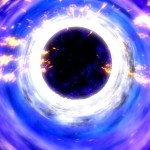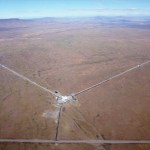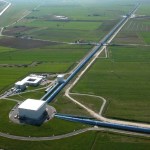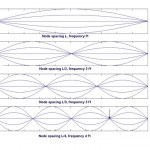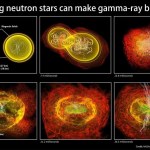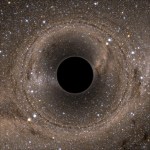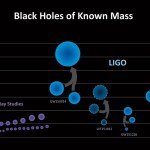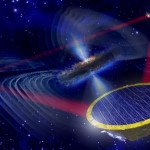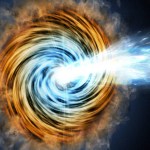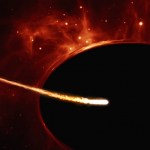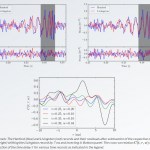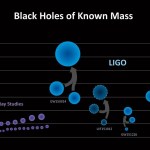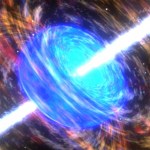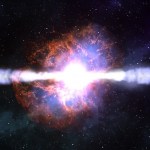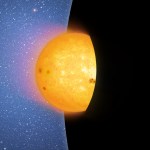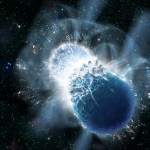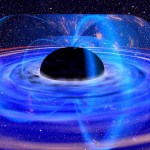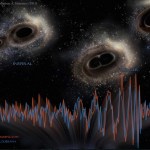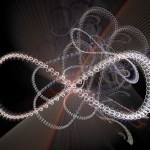Black Holes
"You were always a good officer. Until you weren't." -Saru, from Star Trek: Discovery
Science is full of great ideas and brilliant discoveries, and some of those more recent ones have made their way into the popular consciousness. TED talks, popular blogs and online magazines, and Facebook pages and internet memes have helped disseminate bits of knowledge to millions. But how much of what's come through is actually worth knowing, versus how much is simply science-sounding buzzwords that's content-free?
Outside the event horizon of a black hole, General Relativity and quantum field theory are…
"Well, I walked into Building 20 and looked in at the various little labs. There was a bunch of people doing something that looked to me to be sort of interesting, and since I knew all this electronics, I asked them, “Look, can you use a guy?” And I sold myself off as a technician for about two years." -Rai Weiss, on the start of his physics career at MIT
It’s official at long last: the 2017 Nobel Prize in Physics has been awarded to three individuals most responsible for the development and eventual direct detection of gravitational waves. Congratulations to Rainer Weiss, Kip Thorne, and…
"Einstein's gravitational theory, which is said to be the greatest single achievement of theoretical physics, resulted in beautiful relations connecting gravitational phenomena with the geometry of space; this was an exciting idea." -Richard Feynman
For over a century after the publication of General Relativity, it was uncertain whether gravitational waves were real or not. It wasn’t until their first direct detection less than two years ago, by the LIGO scientific collaboration, that their existence was spectacularly confirmed. With the VIRGO detector in Italy coming online this year to…
“There will be days when we lose faith. Days when our allies turn against us...but the day will never come that we forsake this planet and its people.” ―Optimus Prime
There was too much to simply keep it to a single article a day this week here at Starts With A Bang! The dynamic duo of Megan Watzke and Kimberly Arcand published a delightful contribution on scale, and we're gearing up for a month where we'll highlight some of the telescopes of the 2020s (and maybe beyond) that will help shape the future of astronomy.
In the meantime, those of you who caught totality from the eclipse…
"It’s becoming clear that in a sense the cosmos provides the only laboratory where sufficiently extreme conditions are ever achieved to test new ideas on particle physics. The energies in the Big Bang were far higher than we can ever achieve on Earth. So by looking at evidence for the Big Bang, and by studying things like neutron stars, we are in effect learning something about fundamental physics." -Martin Rees
Two years ago, advanced LIGO turned on, and in that brief time, it’s already revealed a number of gravitational wave events. All of them, to no one’s surprise, have been merging black…
"Presently thought to be the most powerful explosions in nature... their sources have only recently been localized by observations of associated afterglows in X-rays, visible light, and radio waves, delayed in that order." -Richard Matzner, on the dictionary entry for Gamma Ray Burst
It seems like an eternity ago, but it’s been under two years since LIGO first began the science run that would first detect merging black holes. Their latest scientific data run is scheduled to end in just two days, and thus far, they’ve announced a total of three black hole-black hole merger discoveries, along…
“Maybe that is our mistake: maybe there are no particle positions and velocities, but only waves. It is just that we try to fit the waves to our preconceived ideas of positions and velocities. The resulting mismatch is the cause of the apparent unpredictability.” -Stephen Hawking
So, you’ve got a black hole in the Universe, and you want to know what happens next. The space around it is curved due to the presence of the central mass, with greater curvature occurring closer to the center. There’s an event horizon, a location from which light cannot escape. And there’s the quantum nature of the…
"Our first priority was making sure we weren’t fooling ourselves." -Keith Riles, LIGO team member
When LIGO announced their first discovery of a black hole-black hole merger, it came as a surprise to almost everyone. The shocking part wasn’t that LIGO had seen merging black holes, but that they were discovered to be so massive. At right around ~30 solar masses each, these were black holes that were much larger than expected, forcing astronomers to confront the fact that they didn’t have a good, comprehensive model for how many black holes -- and what mass they should be -- were in the…
"The years of searching in the dark for a truth that one feels but cannot express, the intense desire and the alternations of confidence and misgiving until one breaks through to clarity and understanding, are only known to him who has himself experienced them." -Albert Einstein
In 2015, for the very first time, gravitational waves were directly detected from the merger of two massive black holes. These ripples in space traveled over a billion light years before they were finally detected. When they were, it validated Einstein’s theory of General Relativity in an entirely new fashion, and…
"Ultramassive black holes — that is, black holes with masses exceeding 10 billion solar masses — are probably not rare; several and even dozens of these colossal black holes may exist." -Julie Hlavacek-Larrondo
The largest black hole in the Universe was a shocker when it was first discovered. At 40 billion solar masses, it certainly is impressively large. Like other quasars and active galaxies, it has a luminous accretion disk that can be seen from a great distance. Like only a few, one of its two incredibly energetic, polar jets is pointed directly at Earth, creating a blazar, the…
“Nobody ever did, or ever will, escape the consequences of his choices.” -Alfred A. Montapert
So you’re passing by a black hole in a massive, fast-moving spaceship, and you want to do an experiment: you tether a small mass outside of the ship and let it fall into the black hole, just allowing it the tiniest bit inside, while your ship takes off to try and escape. If you can keep the tether from breaking and your ship from getting stretched apart, what’s going to happen?
Even something as massive as a star, if brought too close to a black hole, will find itself stretched-and-compressed into a…
"We hope that interested people will repeat our calculations and will make up their own minds regarding the significance of the results. It is obvious that "belief" is never an alternative to "understanding" in physics." -J. Creswell et al.
Three times now, the LIGO collaboration has produced very strong evidence that black hole pairs, from across the Universe, inspiraled and merged, producing gravitational waves. The twin LIGO detectors in Hanford, WA and Livingston, LA each detected these signals, and the signals were correlated between both detectors. For the first time ever (and the…
"What's really exciting is what comes next. I think we're opening a window on the universe -- a window of gravitational wave astronomy." -Dave Reitze, executive director of LIGO
It revolutionized our view of the Universe when the LIGO annoucements – and we’re up to three, now – came out. They indicated the direct detection of gravitational waves from merging black holes, teaching us about a new population of stellar remnants, confirming the existence of gravitational waves, and showcasing yet another victory for Einstein’s General Relativity. But it all rests on one critical assumption: that…
"The black holes collide in complete darkness. None of the energy exploding from the collision comes out as light. No telescope will ever see the event." -Janna Levin
Whenever there’s a catastrophic, cataclysmic event in space, there’s almost always a tremendous release of energy that accompanies it. A supernova emits light; a neutron star merger emits gamma rays; a quasar emits radio waves; merging black holes emit gravitational waves. But if there’s any sort of matter present outside the event horizons of these black holes, they have the potential to emit electromagnetic radiation, or light…
"Black holes are the seductive dragons of the universe, outwardly quiescent yet violent at the heart, uncanny, hostile, primeval, emitting a negative radiance that draws all toward them, gobbling up all who come too close…these strange galactic monsters, for whom creation is destruction, death life, chaos order." -Robert Coover
For the third time since it began taking data, the LIGO collaboration discovered direct evidence for merging black holes in the Universe. There's an incredible amount we've learned about black holes and where they're located, however, and very little of it comes from…
"Where we're going, we won't need eyes to see." -Sam Neill, Event Horizon
Are event horizons real? With data taken from around a dozen observatories earlier this year, simultaneously, the Event Horizon Telescope is poised to put together the first-ever direct image of the black hole at the center of our galaxy Sagittarius A*. If event horizons are real, this data should be able to create the first-ever image of it, proving that nothing escapes from inside a black hole once you’ve been swallowed.
Five different simulations in general relativity, using a magnetohydrodynamic model of the black…
"N6946-BH1 is the only likely failed supernova that we found in the first seven years of our survey. During this period, six normal supernovae have occurred within the galaxies we've been monitoring, suggesting that 10 to 30 percent of massive stars die as failed supernovae." -Scott Adams
Everyone knows the recipe for a black hole: create a massive enough star, allow it to burn through the fuel it its core, and wait. After enough time, the core will collapse, creating a type II supernova and a runaway fusion reaction. The outer layers explode while the core implodes, leaving behind a black…
"My discovery that black holes emit radiation raised serious problems of consistency with the rest of physics. I have now resolved these problems, but the answer turned out to be not what I expected." -Stephen Hawking
One of the most puzzling things about Black Holes is that if you wait around long enough, they’ll evaporate completely. The curved spacetime outside of the event horizon still undergoes quantum effects, and when you combine General Relativity and quantum field theory in exactly that fashion, you get a blackbody spectrum of thermal radiation out.
Hawking radiation is what…
"We have never observed infinity in nature. Whenever you have infinities in a theory, that's where the theory fails as a description of nature. And if space was born in the Big Bang, yet is infinite now, we are forced to believe that it's instantaneously, infinitely big. It seems absurd." -Janna Levin
You’ve likely heard that there’s no sound in space; that sound needs a medium to travel through, and in the vacuum of space, there is none. That’s true... up to a point. If you were only a few light years away from a star, stellar remnant, black hole, or even a supernova, you’d have no way to…
“Time travel used to be thought of as just science fiction, but Einstein's general theory of relativity allows for the possibility that we could warp space-time so much that you could go off in a rocket and return before you set out.” -Stephen Hawking
As always, there's been a new fantastic week of articles here at Starts With A Bang, punctuated by our new podcast this month, on the physics of time travel!
Have a listen (or download it and take it with you) and thank our Patreon supporters for making it possible! Now, what was this past week all about? Come enjoy some fabulous stories…
